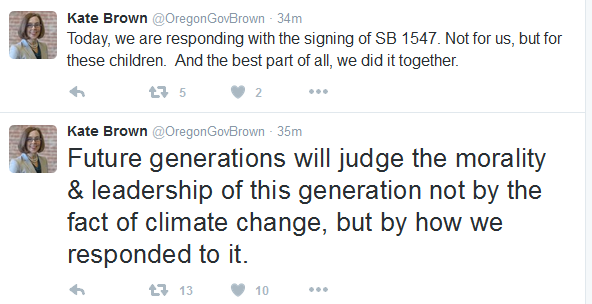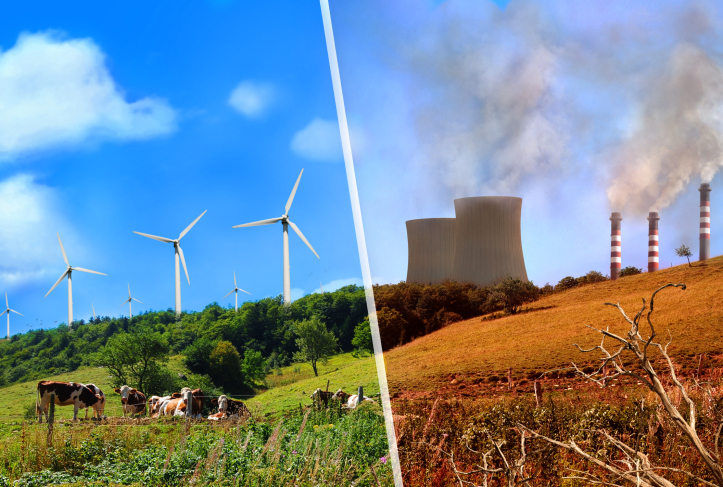As expected, Gov. Kate Brown, D-Ore., has signed into law S.B.1547-B, the Clean Electricity and Coal Transition plan, which calls for increasing renewables and eliminating coal from Oregon’s energy sources.
Specifically, the bill – passed by Oregon legislators earlier this month – requires Pacific Power and Portland General Electric (PGE), the state’s two biggest utilities, to increase their renewable portfolio standards (RPS) to 50% by 2040, as well as sets timelines for them to eliminate coal-fired generation from their customers’ energy mix no later than the end of 2035.
The state’s existing RPS, adopted in 2007, requires the utilities to maintain a 20% RPS by 2020 and 25% RPS by 2025, according to PGE. Along with increasing the RPS to 50% by 2040, the newly signed law includes intermediate steps of 27% by 2025, 35% by 2030 and 45% by 2035.
“Maintaining the affordability and the reliability of the electric grid is very important to us,” noted Scott Bolton, Pacific Power’s vice president of external affairs, after the bill was passed by the legislative assembly. “Working through the legislative process with a diverse range of stakeholders, we have meaningfully advanced Oregon’s clean energy future in a way that is both workable and affordable.”
Also included in the bill are mechanisms to protect utility customers from excessive cost increases or reliability issues resulting from the new mandates, explains PGE in a release, which adds that other provisions promote community solar installations, transportation electrification, energy efficiency measures, small-scale renewable power projects, and power generation from biomass.
Rachel Shimshak, executive director of Renewable Northwest – a clean energy advocacy group and regional partner of the American Wind Energy Association (AWEA) – believes the plan “will set Oregon apart as a national leader on the path to a clean energy future.”
The governor signed the bill today at James John Elementary, a North Portland school that uses solar panels to generate electricity and educate students about renewables.
“Knowing how important it is to Oregonians to act on climate change, a wide range of stakeholders came to the table around Oregonians’ investments in coal and renewable energy,” says Brown. “Working together, they found a path to best equip our state with the energy-resource mix of the future.
“Now, Oregon will be less reliant on fossil fuels and shift our focus to clean energy. I’m proud to sign a bill that moves Oregon forward, together with the shared values of current and future generations,” she adds.
Tom Kiernan, CEO of AWEA, states, “Thank you, Gov. Brown, for your leadership in signing this historic bill into law. This is a result of a strong bipartisan effort by members of the Oregon legislature choosing to build a better future for Oregon families. Growing wind energy in the state will deliver savings on their electricity bills, cleaner air and well paying jobs.”
AWEA says wind power installed in Oregon today helps avoid over 1.4 million metric tons of carbon-dioxide emissions a year – or 307,000 cars’ worth of carbon emissions. Wind also helps Oregon conserve over 750 million gallons of water every year, according to the association.
Kristen Sheeran, Climate Solutions’ director for Oregon, says the bill not only “puts Oregon on a bold new course,” but also “raises the bar for clean energy in other states.”
AWEA notes that Oregon, Hawaii, California and Vermont all have state RPS laws of 50% or more and that New York may soon become the fifth state.
“We applaud the Oregon legislature, the unique “Clean Coalition”s unfailing efforts and Governor Brown’s leadership in ensuring that Oregon remains at the vanguard of developing and utilizing renewable energy,” says
Art Sasse, director of communications and brand at Iberdrola Renewables LLC – which is headquartered in Portland – applauds the efforts “in ensuring that Oregon remains at the vanguard of developing and utilizing renewable energy.”
“This is a state that has a proud legacy of protecting its natural resources and continuing to care and act toward ensuring cleaner air, water and land for future generations, and our corporate employees are equally proud to call Oregon their home,” Sasse adds.





